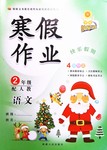题目内容
Genius is a complicated concept , many different factors.
A. involved B. involving C. to involve D. being involved
B
【解析】
试题分析:句意:天才是一个复杂的概念,涉及很多因素。此处相当于一个非限制性定语从句which involves many different factors.将其改成短语的形式就是现在分词短语involving many different factors.
考点:考查非谓语动词的用法。

 学练快车道快乐假期寒假作业系列答案
学练快车道快乐假期寒假作业系列答案"Genius" is a complicated concept, _ _ many different factors.
| A.involved | B.involving | C.to involve | D.being involved |
What makes one person more intelligent than another? What makes one person a genius, like the brilliant Albert Einstein, and another person a fool? Are people born intelligent or stupid, or is intelligence the result of where and how you live? These are very old questions and the answers to them are still not clear.
We know, however, that just being born with a good mind is not enough. In some ways, the mind is like a leg or an arm muscle. It needs exercise. Mental (done with the mind) exercise is particularly important for young children. Many child psychologists (心理学家) think that parents should play with their children more often and give them problems to think about. The children are then more likely to grow up bright and intelligent. If, on the other hand, children are left alone a great deal with nothing to do, they are more likely to become dull and unintelligent.
Parents should also be careful with what they say to young children. According to some psychologists, if parents are always telling a child that he or she is a fool or an idiot, then the child is more likely to keep doing silly and foolish things. So it is probably better for parents to say very positive (helpful) things to their children, such as “That was a very clever thing you did.” or “You are such a smart child.”
【小题1】 The words “intelligent” and “brilliant” in the first paragraph probably mean _______ while “dull” in the second paragraph means ________.
| A.bright and splendid; slow in thinking and understanding | B.pretty and handsome; ordinary-looking |
| C.great and important; common | D.hopeful and helpful; careless |
| A.a normal person; a funny person | B.a strong person; a weak person |
| C.a highly intelligent person; a foolish or weak-minded person | D.a famous person; an ordinary person |
| A.whose parents are clever | B.often thinking about difficult problems |
| C.often helped by his parents and teachers | D.born with a good brain and putting it into active use |
| A.to praise and encourage their children more often | B.to be hard on their children |
| C.to leave their children alone with nothing to do | D.to give their children as much help as possible |
| A.Parents play an important part in their children’s growth. |
| B.The less you use your mind the duller you may become. |
| C.Intelligence is obviously the result of where and how you live. |
| D.What makes a person bright or stupid is still under discussion. |
请从三个人物中选择你最喜欢的一位,用英语写一篇120词左右的短文。要求根据所给信息作适当发挥,且需包括以下三部分内容:
1.对该人物的简单介绍;
2.喜欢该人物的理由;
3.从该人物身上得到的启示。
| Thomas Edison | Helen Keller | William Shakespeare |
| inventor; creative; diligent; full of wisdom | ordinary but great woman; disabled; optimistic; eager to learn | writer; talented; imaginative; man of all ages |
| “Genius is one percent inspiration and ninety-nine perspiration.” | “…if I had the power of sight for three days.” | “Life is a stage…” |